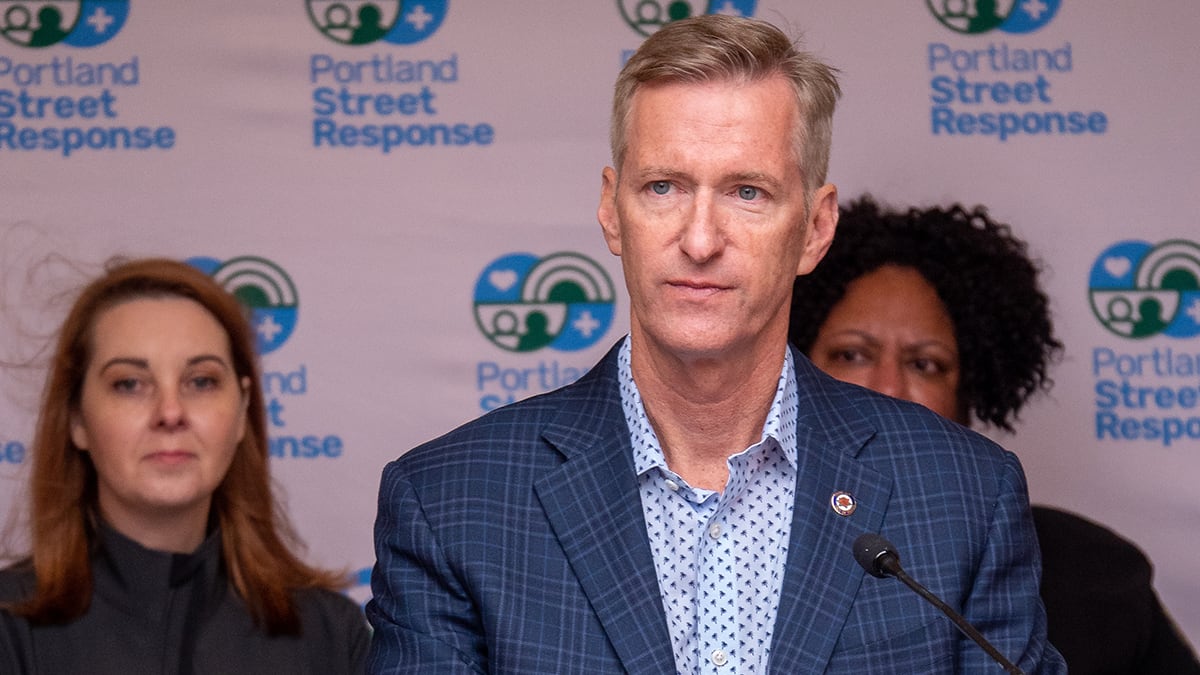Public safety in Portland has undergone significant upheaval in the past two years, including six months of racial justice protests, the establishment of an unarmed crisis team called Portland Street Response, contentious contract negotiations between the city and its police union, a new voter-approved community police oversight board, and a historic rise in gun violence.
In response to those conditions, Mayor Ted Wheeler has coined a slogan to summarize his budget proposals: “Reform, refocus and restaff.”
The Portland Police Bureau is asking for a net increase of $15 million in its operating budget for the next fiscal year. So WW sat down with Wheeler, who oversees the police, to gauge this vision. The interview has been edited for brevity and clarity.
WW: In terms of public safety, what are your areas of focus for the upcoming budget cycle?
Ted Wheeler: By any objective measure, the Portland Police Bureau was understaffed when I got here, and it’s more critically understaffed today. And that is officers per capita, by precinct, call response times—the bottom line is we need more staff.
I will be looking in the near term at the public safety support specialist [PS3] program. I think that is our best opportunity in the near term to bring in more personnel. The work they do then frees up sworn, trained, armed officers to focus on serious criminal activity.
How many police personnel do you want to hire?
We’re looking at least 100 PS3s and potentially 200 sworn officers. The math may not work out exactly like that, but that’s the goal we’re working towards.
What would make someone want to become a police officer in Portland?
There’s one kind of individual who looks for the security and the safety of coming into an organization that’s at the top. There are those who see an opportunity to be part of a changing, evolving organization that’s taking the steps necessary to lead the kind of changes that the public wants to see with regard to policing in the future.
We could eventually be in a position, with enough of these changes taking hold, where people say, “You know, Portland is leading the way in terms of showing what an evolved, successful, effective Police Bureau looks like.”
We’re not there yet. I’m not declaring victory. But when you see the dynamic between our elected leaders and our police leaders improving markedly, all of those things should be seen as a good bellwether of future opportunity for people who want to join the Police Bureau.
How would you grade District Attorney Mike Schmidt’s handling of gun violence cases?
My conversations with him have been very productive. For his district attorneys to be able to close cases, they need good investigative follow-up and good evidence. That’s why we strengthened the Enhanced Community Safety Team. If he gets garbage input, there’s nothing he can do about it at that point. So that was our pledge to him.
Now, where he’s struggling a little bit right now, and he’s said so publicly, is he’s chronically understaffed. His duty is to lobby the county commissioners to get whatever resources his folks need in order to prosecute the cases that we are investigating, and I have pledged to work with him to do that.
You recently fired the former president of Portland’s police union, Officer Brian Hunzeker. Did that affect your relationship with the union or the rank and file?
Terminating somebody is always a difficult thing to do. In this case, I have absolutely no qualms about the decision I made.
Policing is a special profession, and it requires people with a strong sense of ethics and a willingness to take the responsibility that they are entrusted with very seriously. They are the only public officials who have the authority to use lethal force.
And as such, I have no qualms about holding those individuals to a very high standard of conduct. I believe whilst there has been some grumbling amongst the rank and file, who feel that I was too harsh in the accountability that I meted out, I think it’s also important that officers respect civilian oversight of policing. And over a period of decades, the Portland City Council ceded much of that authority to the Police Bureau itself.
When I was here originally, I rarely met with the president of the Portland Police Association. When I did, it was very unproductive. The communications between the Portland Police Association and the City Council were toxic when I got here. That has changed significantly under Aaron Schmautz, the new PPA president. He has been a problem-solver who’s been willing to work with members of the Portland City Council.
What I hope is, all of these things combined will lead potential candidates around the nation to say, “Portland’s getting it right.” Portland has a Police Bureau that can evolve, that can innovate, that can lead in terms of defining what policing looks like in the future.
